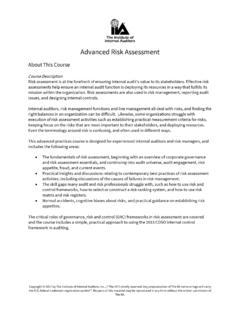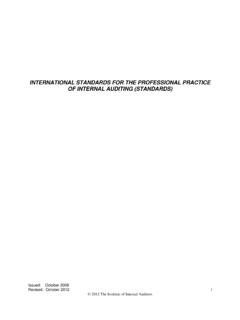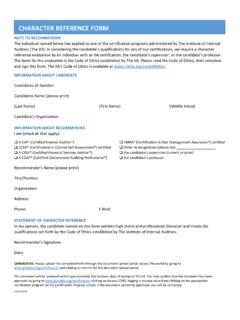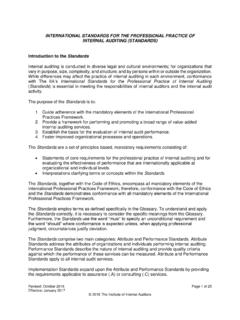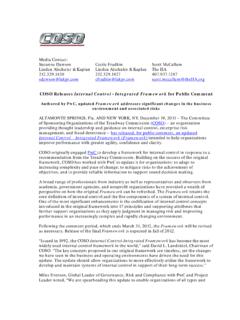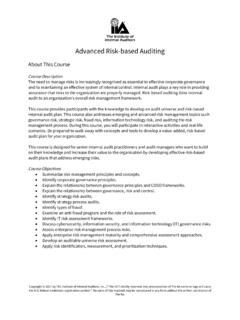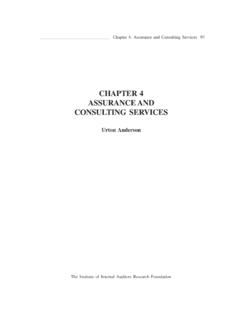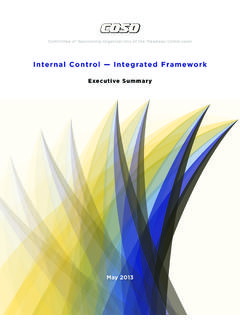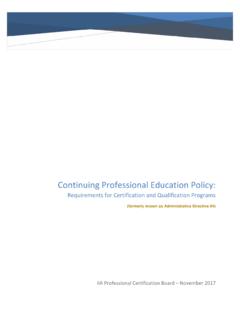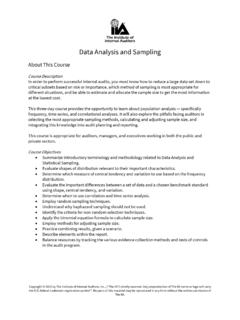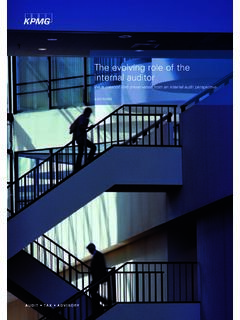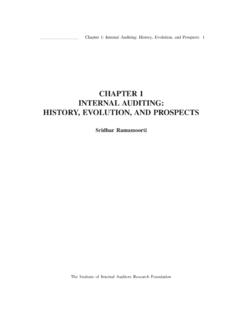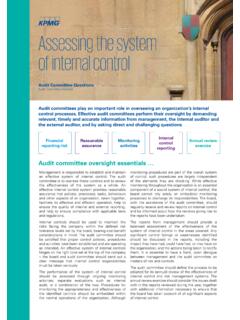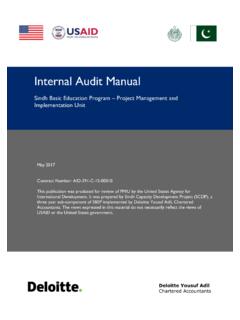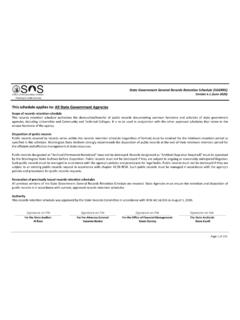Transcription of Core Competencies for Today’s Internal Auditor
1 Core Competencies for Today s Internal AuditorTHE IIA S GLOBAL Internal AUDIT SURVEYA COMPONENT OF THE CBOK STUDY The IIA s Global Internal Audit Survey: A Component of the CBOK StudyCore Competencies for Today s Internal AuditorReport IIJames A. Bailey, PhD, CIA, CPAD isclosureCopyright 2010 by The Institute of Internal auditors Research Foundation (IIARF), 247 Maitland Avenue, Altamonte Springs, Florida 32701-4201. All rights reserved. No part of this publication may be reproduced, stored in a retrieval system, or transmitted in any form by any means electronic, mechanical, photocopying, recording, or otherwise without prior written permission of the IIARF publishes this document for informational and educational purposes. This document is intended to provide information, but is not a substitute for legal or accounting advice. The IIARF does not provide such advice and makes no warranty as to any legal or accounting results through its publication of this document.
2 When legal or accounting issues arise, professional assistance should be sought and Institute of Internal auditors (IIA s) International Professional Practices Framework (IPPF) comprises the full range of existing and developing practice guidance for the profession. The IPPF provides guidance to Internal auditors globally and paves the way to world-class Internal mission of The IIARF is to expand knowledge and understanding of Internal auditing by providing relevant research and educational products to advance the profession IIA and The IIARF work in partnership with researchers from around the globe who conduct valuable studies on critical issues affecting today s business world. Much of the content presented in their final reports is a result of IIARF-funded research and prepared as a service to The Foundation and the Internal audit profession. Expressed opinions, interpretations, or points of view represent a consensus of the researchers and do not necessarily reflect or represent the official position or policies of The IIA or The 978-0-89413-697-912/10 First PrintingiiA Component of the CBOK StudyDedicationWilliam G.
3 Bishop III, CIA, served as president of The Institute of Internal auditors from September 1992 until his untimely death in March 2004. With a motto of I m proud to be an Internal Auditor , he strived to make Internal auditing a truly global profession. Bill Bishop advocated quality research for the enhancement of the stature and practice of Internal auditing. To help enhance the future of this profession, it is vital for the profession to document the evolution of the profession Component of the CBOK StudyIntentionally left blank Table of ContentsAcknowledgments .. viiAbout the Author ..ixForeword .. xiExecutive Summary .. xvChapter 1 Introduction ..1 Chapter 2 General Competencies ..5 Chapter 3 Behavioral Skills ..11 Chapter 4 Technical 5 Knowledge ..23 Chapter 6 Audit Tools and Techniques ..25 Chapter 7 Internal Audit 8 Quality Assurance and Improvement Programs.
4 35 Chapter 9 Conclusion ..41 Appendices Overview ..43 Appendix 1 Summary of Core Competency Related Guidance and Resources ..45 Appendix 2 General Competencies ..49 Appendix 3 Behavioral Skills ..51 Appendix 4 Technical 5 Knowledge ..55 Appendix 6 Audit Tools and Techniques ..57 Appendix 7 Internal Audit 8 Quality Assurance and Improvement Programs ..67 The IIA s Global Internal Audit Survey Questions ..73 The IIA s Global Internal Audit Survey Glossary ..79 The IIA Research Foundation Sponsor Recognition ..83 The IIA Research Foundation Board of Trustees ..85 The IIA Research Foundation Committee of Research and Education Advisors ..86vA Component of the CBOK StudyIntentionally left blank AcknowledgmentsThe 21st century presents unprecedented growth opportunities for the Internal audit profession. Advances in technology, the confluence of the Information and the Internet Age, and the sheer speed and expansion of communications capabilities have significantly accelerated the pace of globalization.
5 Governance, risk, controls, and compliance processes within organizations have undergone significant change to manage the increasing complexity and sophistication of global business operations. All of these developments offer a huge opportunity for Internal audit functions, whether in-sourced, co-sourced, or outsourced, including the potential to add even greater value to their respective organizations. To ensure that a body of knowledge is systematically built up, developments in practice in a dynamically changing environment must be carefully monitored and continually analyzed to reveal critically important insights. Key lessons learned from the experience of the profession must constitute part of the historical record and be transmitted to current and future generations of Internal audit professionals for optimal outcomes. Not only must we strive to secure a robust portrayal of the current state of the profession, but encourage practice-relevant research to inform and push the boundaries of are fortunate that under the auspices of the William G.
6 Bishop III, CIA, Memorial Fund, administered by The IIA Research Foundation, it is possible to undertake large-scale studies of the global Internal audit profession. We sincerely appreciate Mary Bishop s passion and commitment to further the Internal audit profession while honoring Bill Bishop s legacy. The inaugural Common Body of Knowledge (CBOK) survey under William Taylor s leadership occurred in 2006; this is the second iteration. Based on the responses from The IIA s Global Internal Audit Survey from 2006 and now in 2010, it is possible to compare results and perform high-level trending. Five reports cover the full spectrum of a wide range of the survey questions (carefully designed to allow for comparison between the 2006 and 2010 survey data). These reports cover topical content from characteristics of an Internal audit activity to implications for charting the future trajectory of the profession. The cooperation and sharing among the five report-writing teams representing the Americas, Asia, Europe, and the Middle East have made this project a truly global and collaborative hope that this collection of reports describing the expected influence of major themes about, and developments in, the profession as extracted from the survey will provide a comprehensive snapshot of the profession globally, offer helpful insights and actionable intelligence, and point the way forward to maintaining the profession s continued relevance and value-added contributions.
7 For a large global project such as The IIA s Global Internal Audit Survey, the list of individuals to thank is quite extensive. First of all, our special thanks go to IIA Research Foundation Trustee Marjorie Maguire-Krupp who was involved at the inception of the CBOK study in the fall of 2008, and soon thereafter, retired former IIA President David Richards who, along with Michelle Scott, provided the initial leadership to this significant project. viiA Component of the CBOK StudyIn addition, we must acknowledge William Taylor and Leen Paape, both advisors to the CBOK 2010 study co-chairs, and the following international members of the CBOK 2010 Steering Committee, as well as the Survey Design Subcommittee and the Deliverables Oversight Subcommittee, for their guidance and significant contributions to the survey design, administration, data collection, interpretation, and topic-specific reports: Abdullah Al-Rowais, AbdulQader Ali, Audley Bell, Sezer Bozkus, John Brackett, Ellen Brataas, Edouard Bucaille, Adil Buhariwalla, Jean Coroller, David Curry, Todd Davies, Joyce Drummond-Hill, Claudelle von Eck , Bob Foster, Michael Head, Eric Hespenheide, Greg Hill, Steve Jameson, B atrice Ki-Zerbo, Eric Lavoie, Luc Lavoie, Marjorie Maguire-Krupp, John McLaughlin, Fernando Mills, Michael Parkinson, Jeff Perkins, Carolyn Saint, Sakiko Sakai, Patricia Scipio, Paul Sobel, Muriel Uzan, R.
8 Venkataraman, Dominique Vincenti, and Linda members of these committees must be particularly thanked for their extended participation in what became a prolonged, three-year commitment for this large-scale undertaking. Each of these individuals contributed their leadership, wealth of knowledge and experience, time, and effort to the CBOK study and deserves our deepest Mohammad Abdolmohammadi of Bentley University was key to the 2010 data analysis and preparation of summary tables of the survey responses, as he was for the CBOK study in 2006. Professor Sandra Shelton of DePaul University must be recognized for giving the reports a smooth flow and an overall consistency in style and survey could not have succeeded without the unstinted and staunch support of the survey project champions at The IIA institutes worldwide. At The IIA s global headquarters in Altamonte Springs, Florida, United States, many staff members, especially Bonnie Ulmer and Selma Kuurstra, worked tirelessly and provided indispensable support and knowledge.
9 Bonnie Ulmer, IIARF vice president, David Polansky, IIARF executive director, and Richard Chambers, IIA president and CEO (who simultaneously served as executive director for most of the project), provided the necessary direction for the successful completion of the project. Last but not least, The IIA s 2010 CBOK study component The Global Internal Audit Survey and the resulting five reports owe their contents to thousands of IIA members and nonmembers all over the world who took the time to participate in the survey. In a sense, these reports are a fitting tribute to the contributions made by Internal audit professionals around the globe. CBOK 2010 Steering Committee Co-chairsDr. Sridhar Ramamoorti, CIA, CFSA, CGAPA ssociate Professor of AccountancyMichael J. Coles College of Business Kennesaw State UniversitySusan Ulrey, CIA, FCA, CFEM anaging Director, Risk Advisory ServicesKPMG LLPCore Competencies for Today s Internal AuditorviiiA Component of the CBOK StudyAbout the AuthorJames A.
10 Bailey, PhD, CIA, CPA, is professor of accounting at Utah Valley University (United States) where he teaches a three-course Internal audit program. He teaches Internal auditing, fraud examination, and auditing. He has extensive experience performing external audits for public companies and Internal audits. He is author of a 2010 sponsored research report for the IBM Center for the Business of Government titled Strengthening Control and Integrity: A Checklist for Government Managers. The research report focuses on governance, risk, and control strategies for government managers and boards. Bailey has published articles for the Internal audit profession in Internal Auditor and Internal Auditing on audit committees and their relationships with the Internal audit function. His research focuses on audit committee oversight of the Internal audit function and best practices in this area. He also recently authored and taught continuing education programs in the areas of auditing, accounting, fraud, governance, risk, and control.
